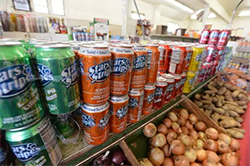
In the News
It’s a Soda Tax, Not a Grocery Tax, and It Works
-
Focus Areas
Chronic Disease Prevention -
Issues
Nutrition & Food Security -
Expertise
Public Policy Advocacy
PHI’s Lynn Silver studied the 2014 tax on sugary drinks in Berkeley, and explains the results: average grocery bills did not go up and sales of unhealthy, sugar-packed drinks dropped significantly. This commentary published in the East Bay Times makes the strong case for passing the tax in order to increase the health and well-being of all residents.
 This fall, residents in San Francisco, Oakland and Albany will vote on a simple 1-cent-per-ounce tax on distributors of sugary drinks. It will raise revenue for health and prevent diabetes. This tax will fall mostly on big soda companies and their bottlers.
This fall, residents in San Francisco, Oakland and Albany will vote on a simple 1-cent-per-ounce tax on distributors of sugary drinks. It will raise revenue for health and prevent diabetes. This tax will fall mostly on big soda companies and their bottlers.
Yet our mailboxes are deluged with junk mail pictures of neighborhood grocers denouncing a “grocery tax.” Online, allegations swirl. Where do these scare tactics come from and whose best interests do they have at heart?
The source is clear. The American Beverage Association, a cabal representing big soda and beverage companies, is spending millions to mislead us and misrepresent what is on the ballot in order to protect their profits.
For facts on the soda tax, we need only look to our neighbors in Berkeley, which passed the nation’s first large tax on sugary drinks in 2014. At the Public Health Institute in Oakland we have been working with University of North Carolina to evaluate that law. A key question was: How does the tax affect grocery bills?
We looked at data from the first 6 months of the tax, covering more than 7 million customer checkouts from two chains of large groceries. The results were clear: Average grocery bills did not go up. In fact, looking at stores in Berkeley and Bay Area comparison communities without the tax, average grocery bills went down a tiny bit in both.
Originally published by East Bay Times
More Updates
Work With Us
You change the world. We do the rest. Explore fiscal sponsorship at PHI.
Support Us
Together, we can accelerate our response to public health’s most critical issues.
Find Employment
Begin your career at the Public Health Institute.



